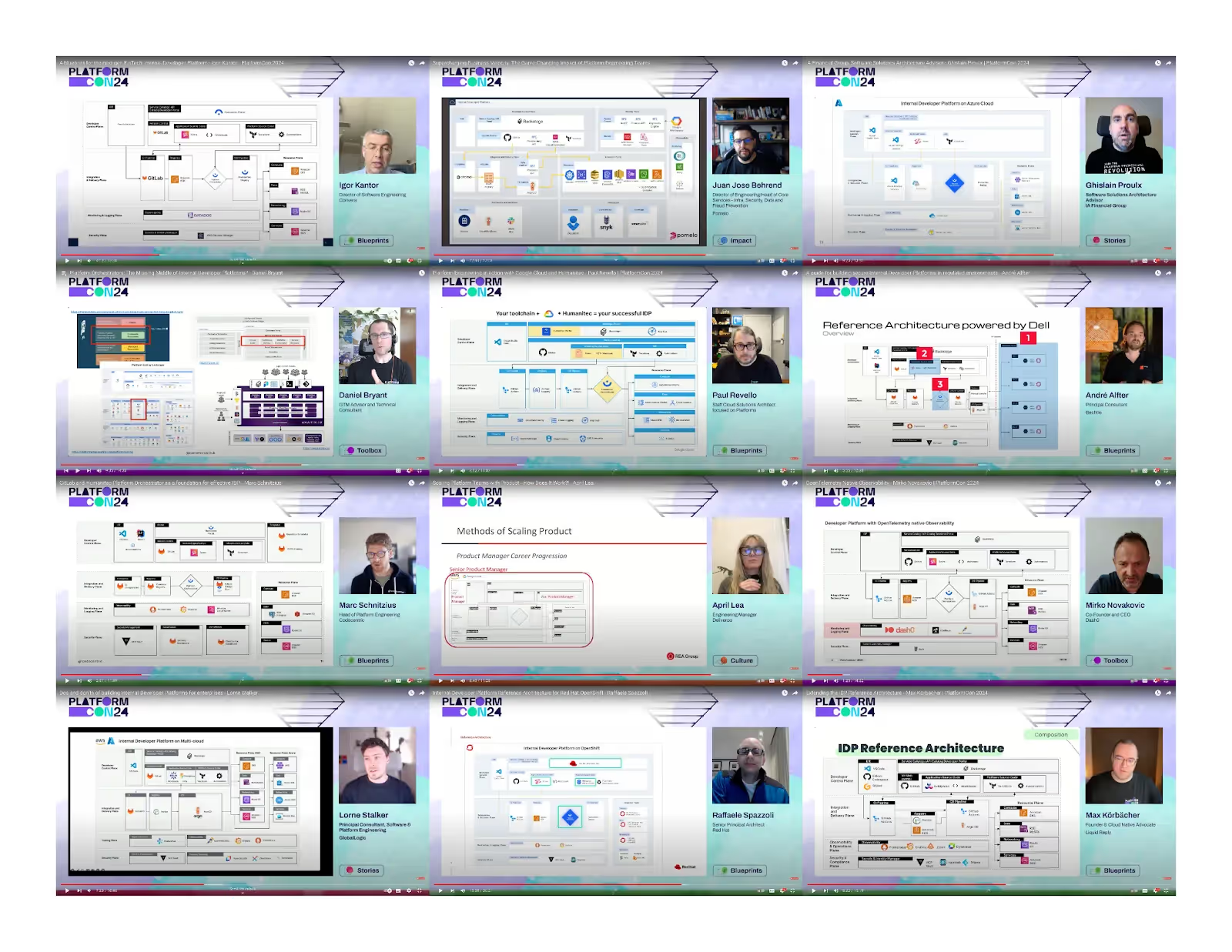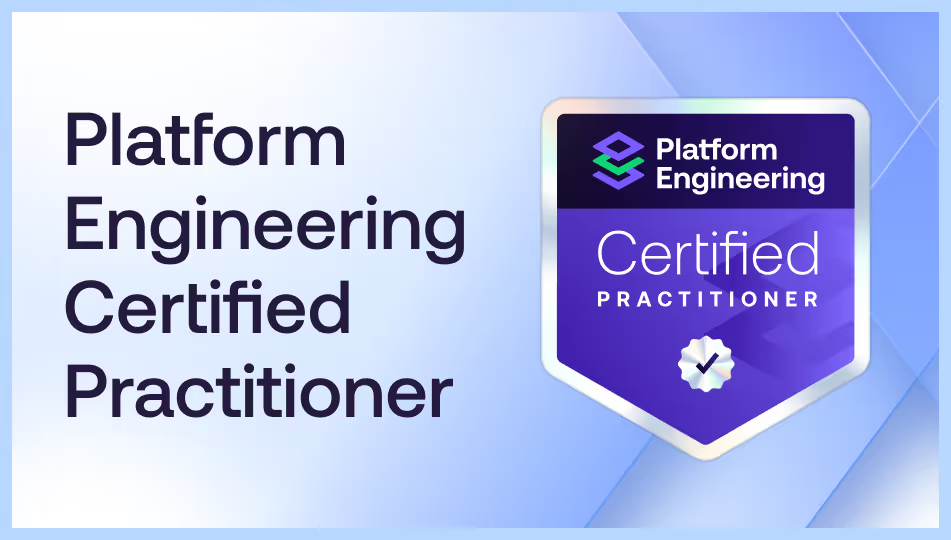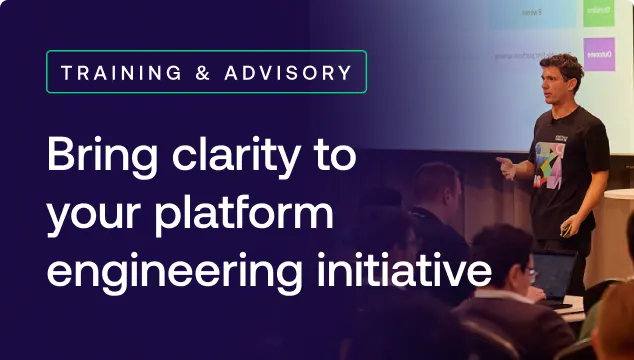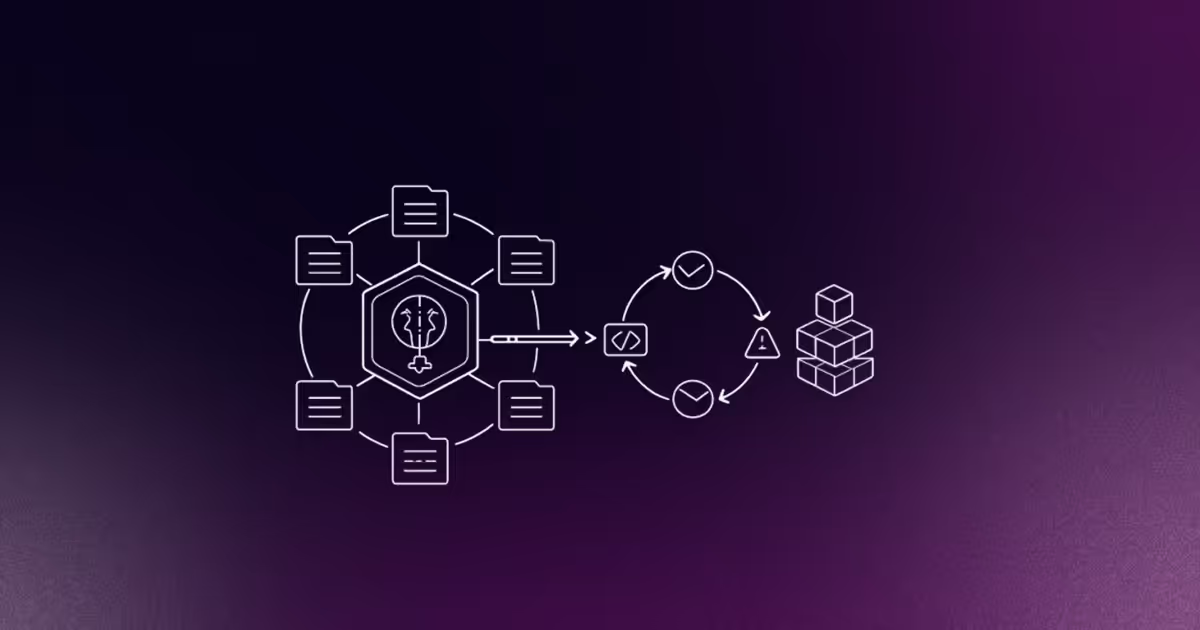The world’s largest platform engineering event, PlatformCon 2024 has come and gone again. This year was far larger and provided a greater variety of content and formats than ever before, including everything from virtual hands-on workshops, and a day of live panels to a full in-person day in London.
PlatformCon isn’t just a large event with almost 35,000 people flowing through it, it is also a fantastic opportunity to examine the zeitgeist of the platform engineering universe. Many of the topics discussed last year were the exact trends that dominated platform engineering over the previous 12 months.
Whether that continues to hold true or not, examining the key trends at PlatformCon 2024 is the perfect way to understand where platform engineering currently is, and where we might be going.
1. Platform as a Product is still king
First popularised by Manuel Pais and Matthew Skelton in their legendary book Team Topologies, Platform as a Product is a foundational concept of platform engineering, and it is no surprise that once again in PlatformCon 2024, it continues to hold powerful sway over the conversation.
In their talk, Platform as a Product: Stories from the Field, Cansu Kavili Örnek and Anna Ciula emphasize the most important part of the platform as a product discussion, just how far we have moved beyond the theoretical, and into the practical. Their talk shares a repeatable framework, which you could run as a workshop with your teams, and clearly defines the changes your organization requires to treat the platform as a product. From this, and other talks like April Lea’s guide to scaling platform teams with product managers, and Stéphane Di Cesare's detailed look at how product management drives value, we can see the continual growth and evolution of Platform as a Product.
2. The Platform Maturity Model
Continuing the theme this year of moving beyond theory into the practical, In her talk, Maturing your platform engineering initiative, Nicki Watt showcased the value of the CNCF platform maturity model and how it can be used as part of a toolbox to help guide organizations through their platform engineering journey. Beginning by identifying a few common scenarios that engineering organizations find themselves in, and then mapping this onto the model.
This talk also effectively demonstrated the growth of PlatformCon from a source of current trends in platform engineering to an incredible hub of resources, best practices, and tools for all manner of practitioners and engineering organizations.
3. Where did the Portals go?
In 2023, almost 30% of all talk submissions to PlatformCon were about Developer Portals, or featured portals either pro or against. There is no denying that Portals were the “thing” of last year. So how is it that this year, there wasn’t just a 90% drop in the submission for talks related to portals, there is only a tiny number of talks that prominently feature portals.
The answer can be found within those exact talks. In their talk, Is platform engineering only about internal developer portals? Think again, Atulpriya Sharma and Vishal Biyani explain how Portals are merely the first step in a platform engineering journey, and the majority of the impact and success from a platform initiative, will come beyond the Portal. At the same time, Derik Evangelista in his talk, Your Backstage needs a Platform emphasized the negative impacts on your platform engineering initiative, if it focuses too heavily on its Portal.
4. Platform Orchestrators are the missing middle
Whether it is the “backend” of your Internal Developer Platform as expressed by Luca Galante in his talk or the “missing middle” by Daniel Bryant, it is clear that Platform Orchestration takes center stage at PlatformCon 2024 this year.
In their talks, “Platform Orchestrator: The platform engineering game changer” and “Platform Orchestrators: The missing middle of Internal Developer Platforms?”, the two examine how platform Orchestrators, the orchestration layer within an internal developer platform that automates and manages complex workflows, infrastructure provisioning, and resource management are the crucial step in ensuring an effective platform initiative.
They also explain how the frontend-first approach of placing a Portal on top of your set-up and patting yourself on the back is not enough to deliver the promised results of platform engineering or serve the needs of large engineering organizations.
5. AI is everywhere
Even in the heart of the platform engineering revolution, you can’t escape AI. Whether it is Manjunath Bhat’s extensive breakdown on how he believes AI will reshape the future of DevOps and cloud, or the joke “we made it XYZ minutes without mentioning AI” that was made in almost all the live panels and conversations we had.
It is no surprise that AI was mentioned dozens of times throughout the conference. Still, no one dived as deeply into its potential impact as Manjunath Bhat in his talk, “How platform engineering teams can augment DevOps with AI”. With Gartner predicting that by 2027, the number of platform engineering teams using AI to augment every phase of the SDLC will have increased from 5% to 40%, Manju’s talk emphasized how platform engineers will play a key role in answering the question of “What are the opportunities for AI to shape DevOps/DevSecOps within a three-year horizon”.
And on the flipside, James Brookbank, Cloud Solutions Architect Manager, Google said it best when discussing how AI and Platform Engineering intersect:
“A really good platform will be a big differentiator for you in terms of rapidly deploying AI in your organizations. All the bits that we talk about—security, compliance, guardrails, golden paths—are critical for those systems.”
Platform engineering will drive better AI. And AI will drive better platform engineering.
From workshops to talks on AI platforms and a live panel on the final day. AI was everywhere this year.
6. Reference architectures
Launched last year at PlatformCon 2023 by Humanitec, and Mckinsey and then later open-sourced, the community platform engineering reference architectures have clearly taken platform engineering by storm.

Over 15% of all talks included some form of this platform engineering reference architecture, adapting it to fit their own organization. And in a great talk, Max Körbächer even highlighted steps that could be taken to expand the reference architecture to be more all-encompassing.
If you want to make your own or see more about how they work. Take a look at the template we shared in a previous article.
7. Challenges, from how to start to how to scale
Reference architectures are great, but one key trend of this year’s PlatformCon is that the challenges facing most platform teams - usually aren’t entirely technical. It is the cultural challenges that are usually the most difficult for organizations. Questions like - how can you ensure adoption? What is the best way to get started? How can we scale?
Luckily, a lot of those questions got some pretty good answers.
In the talk, Minimum Viable Platform (MVP): A proven success framework to kick off your platform engineering initiative, Mallory Haigh explains the concept of a Minimum Viable Platform and how organizations are using it to get started platforming fast, and easy. Mathieu Benoit’s hands-on platform engineering workshop Build a Minimum Viable Platform (MVP) in 2 hours highlights just how fast, by getting you started live in no time at all.
At the same time, Cansu and Anna in their talk, Internal platform champions: Build trust, drive adoption, and Kaspar von Grünberg in Driving platform adoption: the right way emphasized how important it is to build trust and win the hearts and minds of your stakeholders to ensure adoption as you scale.
Want to see more from PlatformCon?
There are currently over 80 hours of recorded content from PlatformCon 2024. With talks on every topic and category, you can imagine from GitOps to the future of IaC or deep dives into every stage of a platform engineering journey.
You can also find recordings of all live hands-on platform engineering workshops and live talks from PlatformCon London.
Or… get a headstart on PlatformCon 2025 and register now.













